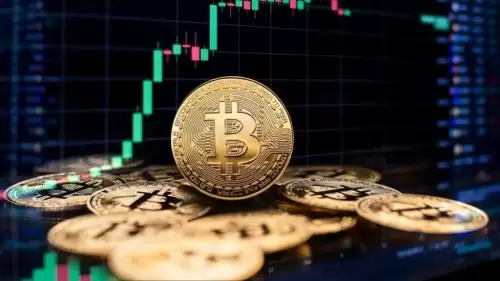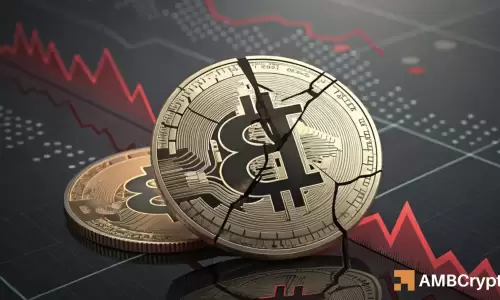 |
|
 |
|
 |
|
 |
|
 |
|
 |
|
 |
|
 |
|
 |
|
 |
|
 |
|
 |
|
 |
|
 |
|
 |
|
Articles d’actualité sur les crypto-monnaies
The OP_RETURN debate: BTC's scripting language gets an upgrade
May 13, 2025 at 10:00 pm
A debate over OP_RETURN and mempool policy has been flaring up in the Bitcoin industry in recent weeks and has by now invaded most conversation spaces within the industry. The topic is rich and complex, and many people have strong opinions on the matter.
For those who missed it, OP_RETURN is an opcode in Bitcoin's scripting language used to store meta data or arbitrary data that is not relevant for bitcoin transaction validation, as such can be pruned by node runners without much issue, enabling more efficient management of spam while also giving developers a controlled environment to anchor data on chain.
Taking a harm reduction approach to the problem of spam, the OP_RETURN controversy was recently triggered by a pull request submitted by Peter Todd to the Bitcoin Core repository. The pull request removed the 80-byte mempool policy limit on OP_RETURN payloads, which in practice limited the size of arbitrary data that could be placed in the script to about 80 bytes. By removing this limit, the maximum size of an OP_RETURN payload is limited only by the consensus block size cap of 1MB of non-SegWit data.
Proponents of the update, such as Todd, argue that the limit is no longer effective at stopping spam and, on the contrary, is leading to more harmful behaviors such as stuffing data in UTXOs, which harm node runners.
The proposal also removed the datacarrier flag, a configuration option that allowed node runners to choose which transactions to filter from their local mempool based on how much arbitrary data the OP_RETURN carried.
The opposition, led by Luke Dashjr, not only wants to keep the OP_RETURN limit in place and retain the datacarrier size but proposes further mempool policy restrictions on arbitrary data and “non-monetary” transactions on Bitcoin.
Both camps generally agree that arbitrary data on Bitcoin is a bad thing for the network. They also agree that filters cannot possibly filter all kinds of spam. What they disagree on is how effective these kinds of filters are in mitigating spam. They also disagree on the consequences of imposing or removing these filters from the network, their impact on the costs of running a node, and their impact on mining centralization.
Of course, not all proponents of the OP_RETURN changes agree with all of the arguments in favor of the pull request, and not all opponents agree with all of the arguments against it. This is just a general (and probably incomplete) overview of the various arguments out there.
In Support Of Removing the OP_RETURN Size Limit
Spearheaded by Peter Todd, though supported by many Bitcoin Core contributors, the removal of the OP_RETURN limit represents a harm reduction approach to the problem of spam and arbitrary data on Bitcoin.
Todd argues that the current OP_RETURN limit, initially placed over a decade ago to give spammers a safe and controlled space for arbitrary data, no longer serves its purpose as companies and enthusiasts have developed direct-to-miner private mempools, such as MARA's Slipstream, that bypass mempool policy.
The OP_RETURN limit was put in place after Satoshi Nakamoto left, to protect the network from similar spam but during a very different era, when blocks were rarely full, much less boasting a high-fee environment. There were also few to no tools for pruning, and the software was very inefficient. Many optimisations have been implemented in the last decade, and their cumulative effects influence this debate.
The OP_RETURN limit was thus more effective when it was first created and more difficult to bypass. Today, NFT and arbitrary data enthusiasts with ambitious projects, pressured out of the OP_RETURN space by the current mempool limit, have resorted to stuffing arbitrary data into the UTXO set instead. Unlike OP_RETURN or SegWit spaces, which can be reasonably pruned off nodes, the UTXO set is generally held in RAM, the most expensive form of memory. The UTXO set needs to be processed by nodes, to verify the supply of coins and be able to validate the integrity of new transactions, a fundamental piece of running a node, without which home nodes lose much of their value proposition. UTXO data stuffing as a result imposes significant costs on node runners by increasing initial block download, overall sync time, and hardware requirements that ultimately harm the decentralisation of the Bitcoin network.
Finally, supporters argue that miners are “rational economic actors,” an economics term meaning that to stay alive in a very competitive market, miners need to optimise for profits wherever possible. Thus, if mining consensus-valid non-standard transactions gives them an edge, they will take it.
Back in 2023, Luke Dashjr proposed a change that sought to apply datacarrier mempool policy to SegWit and Taproot arbitrary data, such as Inscriptions, further restricting the options for spammers. Peter Todd opposed the PR, explaining that “The transactions targeted by this pull request are a very significant source of fee revenue for miners. It is very unlikely that miners will give up that source
Clause de non-responsabilité:info@kdj.com
Les informations fournies ne constituent pas des conseils commerciaux. kdj.com n’assume aucune responsabilité pour les investissements effectués sur la base des informations fournies dans cet article. Les crypto-monnaies sont très volatiles et il est fortement recommandé d’investir avec prudence après une recherche approfondie!
Si vous pensez que le contenu utilisé sur ce site Web porte atteinte à vos droits d’auteur, veuillez nous contacter immédiatement (info@kdj.com) et nous le supprimerons dans les plus brefs délais.
-

- Velo Universe, Dex et Defi Security: naviguer dans l'avenir du trading décentralisé
- Aug 05, 2025 at 07:45 am
- Exploration de l'évolution des échanges décentralisés (DEX) en mettant l'accent sur l'univers Velo, la sécurité Defi et la transition vers des plateformes de trading transparentes centrées sur l'utilisateur.
-

- Le portefeuille Bitget révolutionne Solana avec des transactions sans gaz: une nouvelle ère pour Defi
- Aug 05, 2025 at 07:36 am
- Bitget Wallet conduit la charge pour rendre Solana plus accessible avec des transactions sans gaz, simplifiant Defi pour tout le monde. Découvrez comment cette innovation remodèle l'expérience utilisateur.
-

- Ozak Ai, Boom crypto et potentiel de retour sur investissement: est-ce la prochaine grande chose?
- Aug 05, 2025 at 07:30 am
- Plongez dans le potentiel d'Ozak Ai dans le boom de la cryptographie. Ses outils commerciaux alimentés par l'IA peuvent-ils fournir un retour sur investissement explosif? Nous explorons les tendances et les idées.
-

- Les ETF de Solana et la poursuite de tous les temps High: Sol est-il défini sur Soar?
- Aug 05, 2025 at 07:30 am
- Le buzz de Solana est de retour! La spéculation du FNB, la croissance du réseau et la manie de la pièce mème pourraient pousser Sol vers un nouvel ATH. Mais y a-t-il d'autres joueurs dans le jeu?
-

-

-

-

- Bitcoin, Michael Saylor et Stratégie: un mastodonte de transformation numérique
- Aug 05, 2025 at 07:01 am
- Explorez la stratégie de Bitcoin audacieuse de Michael Saylor, les avoirs massifs de Microstrategy et le paysage évolutif de l'adoption de la cryptographie d'entreprise. Wall Street se fait-il enfin?
-

- Les détenteurs de Bitcoin se préparent à la sortie du marché au milieu des signaux baissiers
- Aug 05, 2025 at 07:00 am
- Les détenteurs de bitcoins à long terme montrent des signes de sortie du marché en tant que statistiques clés flash les signaux baissiers, suggérant une correction potentielle malgré des prix élevés.





























































